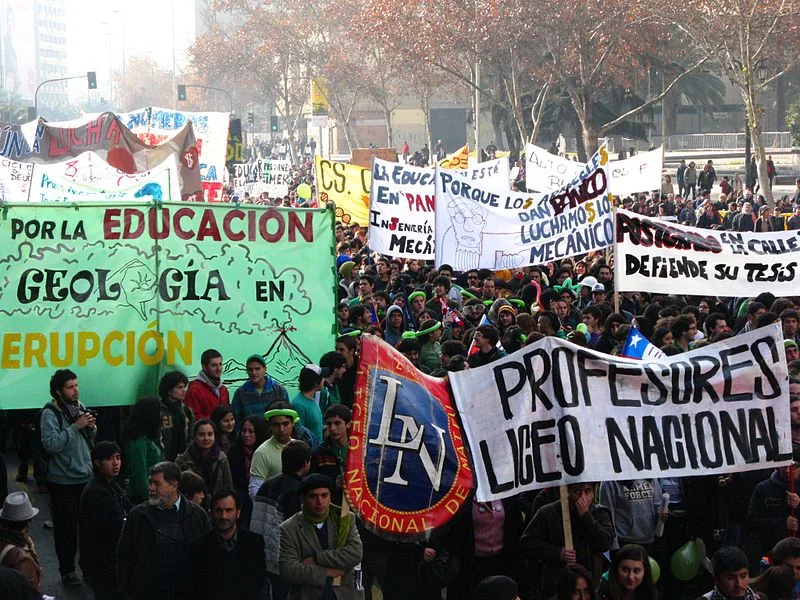Is Chile Turning to the right? Or Just more of the Same?
Chile’s run-off presidential election, held on December 17, witnessed the victory of billionaire businessman, Sebastían Piñera over the left-wing candidate Alejandro Guillier. This will be Piñera’s second term in office; he served as president between 2010 and 2014. The victory was a substantial one, with Piñera winning 54.6 percent of the vote while Guiller, supported by outgoing left-centre President Michelle Bachelet, garnered 45.4 percent of the vote. Much of the press coverage of the election claims that the Chilean election is part of a general right-ward swing in Latin American politics. However, such an assessment papers over what is really going on—not just for Chile, but for other countries of the region as well.
Why the Left Lost
There are a number of important issues to bear in mind. The Chilean economy (along with other Latin American ones) has been hit by the decline in international prices for its major commodity. With the drop in copper prices from 2011, the Chilean economy grew at an average annual rate of less than 2 percent. Oftentimes an economic downturn alone would be enough to persuade former supporters to defect. In Chile, however, there were a variety of other factors at play. A series of corruption scandals, involved both the political right and the left, but impacted out-going President Michelle Bachelet given that her son and daughter-in-law have been implicated. Bachelet’s approval rating plummeted to 25 percent as her critics characterized her as both incompetent and corrupt.
Students Protest Inequalities in Education
In addition, the Bachelet policy performance had little hope of satisfying the disparate demands of this deeply divided society. The administration carried out a series of reforms that for some did not go far enough fast enough, but for others went too far, too fast. There had been mass popular mobilization demanding reform of the country’s highly unequal educational system since the mid-2000s. However, it was not until 2015 that Bachelet passed a law providing for free post-secondary education. However, widespread student demonstrations continued as protestors demanded deeper reforms that would exclude the participation of the private sector in education. At the same time, the increase in corporate taxation, needed to pay for the educational reform and other social programs, angered the private sector. Meanwhile, Bachelet’s progressive social policies (legislation legalizing abortion under certain conditions and providing for gay civil unions) alienated socially conservative members of her own coalition, and galvanized the socially conservative political right. A profound sense of disillusionment with both the political process and the policy output, probably mostly among former left coalition (now known as the New Majority) supporters, may well have been at the root of the low voter turnout of only 48.5 percent.
The Left Splinters and the Right Unites
In addition, the left-centre alliance that had ruled Chile for most of the years since the transition to civilian rule in 1989 was deeply divided by the 2017 election; by that time, it was faced with defections from both ends of the political spectrum. The socially conservative Christian Democrats, who had previously backed left-centre coalition candidates, fielded their own presidential candidate in 2017. In addition, a new political group involving left parties and social movements, the Frente Amplio, also ran its own presidential candidate, calling for a more substantive democracy, a new economic model involving a reduction in the concentration in economic wealth, and the establishment of social rights.
The political right, on the other hand, was strongly united this time around -something it had not been in the past. Given the country’s sluggish economic growth, Piñera’s criticism of the New Majority economic management resonated with a significant portion of the population. Finally, the political right had effectively used scare tactics, with Piñera comparing Guillier to Nicolas Maduro, the socialist leader of the collapsed Venezuelan economy.
Sharp Political Polarization Persists
Sebastían Piñera (second from left) with Chilean businessmen
Given all of this and the fact that 45 percent of the popular vote went to left candidate Guillier, it is premature to proclaim that Chile is “moving right” in terms of popular opposition to policies to mitigate socio-economic inequality. The country remains deeply polarized, with the recent election campaign probably serving to deepen that political polarization. Indeed, Sebastían Piñera promised to reverse the Bachelet’s reforms aimed at reducing socio-economic inequality - reforms considered by many on the left to be far too timid. The pronouncements made by Chile’s incoming President were more conciliatory on election day. Although Piñera declared that the country “needs agreements more than confrontations," and that "paths of the future unite us.”, we need to remember that there are powerful interests backing the Chilean political right, and they will insist on their own policy agenda. Swings in electoral fortunes in Chile, and elsewhere in the region, do not necessarily signal any change in the basic constellation of political forces and their deep and abiding differences.



